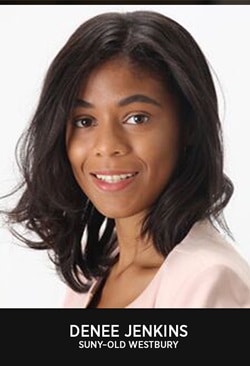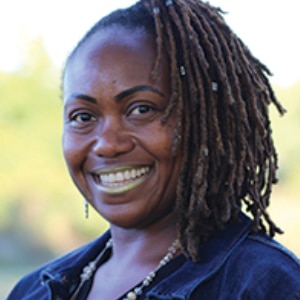Closing the Gap: Where Are They Now?
Last month ACUI announced its third annual cohort of its Closing the Gap career advancement program, and with that came the perfect time to check-in with some of the program’s past participants. This month we feature Denee Jenkins, executive assistant to the president at SUNY–Old Westbury, who was a member of the 2021 cohort. At the time Jenkins became a member of the cohort she was student union building operations and event manager, and the interim assistant director of the center for leadership and involvement at SUNY–Old Westbury. She holds a bachelor’s degree in geography from Binghamton University and a master of science from the University of Albany.
Denee, tell us how you got your start in student affairs.
I got my start in higher education as a student union manager during my undergrad years at Binghamton University in upstate New York. I worked my way up to student union manager supervisor and I was obsessed with that role, but I was also drawn to education and teaching. I gave teaching a try for a bit and later realized that I have a strong mind for operations. I started an operations role in K-12 before transitioning to higher ed as an operations and events manager at my alma mater, Binghamton University. I am a Queens, New York, native and a SUNY brat having earned my masters in curriculum and development and instructional technology from SUNY–Albany.
As part of one of the early Closing the Gap cohorts, did you have any expectations when you entered the program?

I was part of ACUI for about two years before I enrolled in Closing the Gap. I needed to connect with people that didn’t work in my institution but who understood the job and I think I just needed to connect with people that looked like me. I find that sometimes when talking about higher education, people think teaching is the only role you can hold. If you’re not in this environment, it’s hard to explain to non-higher ed folks the nuances of our role and the politics behind it. I needed a space where I could talk to peers who are navigating similar struggles and bounce ideas off them.
During my time in the program, we had several vacancies in our department. Everyone was doing at least two extra jobs, aside from their primary role and on top of that I was wrapping up my master’s program. To say I was burned out is an understatement. I needed to connect with folks who could help me navigate what I was feeling.
How important was the supporter role as a part of the program?
I think it was key having someone who cared about you and to focus on you. Even though the supporters weren’t in my institution it was good to have someone else that knows other people, and who can offer perspective. Access to supporters expands your network without you having to be in the room, so to speak. And the monthly meetings with the cohort created community and built relationships talking about navigating spaces, this was a key topic in our group session. That and figuring out the next step, planning your next move.
What do you mean by “navigating spaces?”
I would say that higher ed is very politicized. If you don’t know that there’s a game being played, then you’re like 10 steps behind before you begin. Many of us think, if I’m the only Black person in the room, or the only person of color in the room, the burden to speak on behalf of everyone, which is impossible because everyone has their own different story and different perspectives. On top of that, each person is at a different place on their social justice journey.
Around June 2020 in the aftermath of George Floyd’s murder I was doing DEI work, which is extremely exhausting, and I was doing it more on the student perspective. I did a lot of programming helping students unpack what they were going through while trying to process it myself. Going to work and feeling peer expectations, taking care not to rock the boat but still desiring change, it’s tough to navigate these spaces. We talked a lot about that in our group sessions and it was helpful to be in a space where I could express what I was feeling and receive validation. It’s another lesson I learned: I don’t have to carry the burden for everyone else.
The peer connection was great. I was partnered with a colleague in my region, and we are still connected today, a year later. We had a similar work ethic, similar personality, and through our sharing sessions, I learned that we were facing similar campus challenges: high turnover, burn-out, and the need for self-care. We became accountability partners throughout the program, and we have a monthly check-in. We also encouraged one another to start journaling. Soul Healing: A Guided Journal for Black Women is a guided journal that has helped me to do more self-reflection.
How did Closing the Gap impact your career development?
Defining your brand was an important part of the program. I realized that every opportunity may not be the right one if it doesn’t align with my brand. From that exercise I gave myself permission to say, “I’ll pass because this is not where my focus should be.” It allowed me to take stock of my actions and make sure that I’m not doing everything but the right things. Being intentional about what will move my career forward is the key.
It was also during this part of the program that I transitioned to my current role as executive assistant to the president.
How did you make the shift from student affairs, a master’s in learning and development, to your present role as an executive assistant?
I didn’t see this coming! If you had asked me if this was on my radar, I would have said no. We had so many vacancies to fill at my institution and a hiring freeze on top of that. I tried to fill the spots that I could and part of that was the DEI work. I knew I wanted to close that gap. After the social justice series and other work I was doing, my president said he kept hearing my name, people would say, “If you need something done, ask Denee.” He saw the work I was doing in student affairs, the work I did in DEI, and my attention to detail. The executive assistant role was a new vacancy in his office, and I got a call to meet with him. I was a bit nervous, who gets a call for the president? We met and he highlighted why he was considering me for the role.
Finally, my hard work paid off. Taking on extra work while in a master’s program and pushing through the burnout, it all paid off. Accepting this role was intentional; I am learning to navigate institutional politics at a different level. There are always politics in any environment and when the role is more public the boundaries you establish are even more important.
Ironically, my career path mirrors my mom, she has an education background, wanted to teach but found herself in training and development AFTER her role as an EA (executive assistant). Her perspective helped me as I made my decision to change course.
What’s the proudest moment of your career so far?
During the Derek Chauvin trial, my president recognized we needed to do something and because of my DEI work, I was looped in to create a series of programming. The goal was to address every facet of the experience, we called it the Social Justice and Action Series. We invited civil rights lawyers to explain what the charges [against Chauvin] meant and the possible outcomes based on how the judge might rule. We took an educational approach to explain how this situation could play out, what did the law say, and the possible impacts.
One of my favorite parts of the series was the Say Their Names vigil. We read every single name on the Say their Names website and lit a candle for each one. It was emotionally draining and at the same time extremely impactful for our students. There wasn’t a dry eye in the room. The experience was a visual representation of the culmination of everything. It was also a shared experience that allowed us to understand the impact of what occurred and continues to occur. We also had support from our counseling center to ensure qualified folks were on stand-by if students needed them.
The series started with education, shifted to reflection, and resulted in action. We created a “Green Book” of our school to connect students with resources they needed, focused students on the importance of voting in elections at all levels. We were nearing election season and wanted student to recognize that voting at all elections is critical.
I realize not all institutions can do this type of work and my president was a major supporter and attended most of the events. Even our police chief attended and was supporter of the event.
I won a regional award for that series of programming that I keep on my desk as a reminder, “If I can do that, I’ve got this.”
What’s on the career horizon for you?
I feel like that is the million-dollar question. I’m a planner, in five years I’ll do this and in another five I’ll do that, but at this stage, I’m ok with not knowing what’s next. What I do know is, I’m passionate about training and development. What’s next for me will involve the application of learning technologies, professional development, building curriculum, and putting my master’s degree to work! I can see myself in a chief of staff role. Whatever the role is, I’ll be in a position to give people the space to grow and to be their best selves.

